|
|
|
Sort Order |
|
|
|
Items / Page
|
|
|
|
|
|
|
| Srl | Item |
| 1 |
ID:
121864
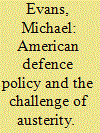

|
|
|
|
|
| Publication |
2013.
|
| Summary/Abstract |
This article examines the Obama administration's attempt to rebalance U.S. strategy towards the Asia-Pacific region with special emphasis on Southeast Asia. It argues that America's regional pivot is occurring at a time of unprecedented domestic fiscal austerity caused by a staggering level of national debt. The U.S. domestic budget crisis, the current "declinist" debate, concern over the rise of China, and the impact of sequestration on American defence spending are analysed and their implications for Southeast Asia are assessed. The article suggests that the most serious aspect of the U.S. debt crisis may be its impact upon American strategic resilience and geopolitical confidence. Thus, while many ASEAN nations have welcomed the U.S. strategic pivot as a valuable reinforcement of their security, they remain unsure that it is a sustainable policy. In the future, it is likely that reassuring ASEAN of the longevity of the U.S. commitment to the Asia-Pacific will require of Washington a skilled blend of budgetary reform, military presence, and sustained diplomatic effort.
|
|
|
|
|
|
|
|
|
|
|
|
|
|
|
|
| 2 |
ID:
107895
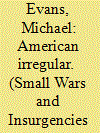

|
|
|
|
|
| Publication |
2011.
|
| Summary/Abstract |
This article examines the portrayal of frontier conflict in American writer, Cormac McCarthy's 1985 novel, Blood Meridian, or the Evening Redness in the West. It argues that McCarthy's work is one of the most profound American literary meditations ever composed on the subject of irregular conflict. The article traces the novel's literary antecedents and historical background and analyses its use of language, its structural narrative, and its lyrical descriptions of bloodshed and extreme guerrilla violence on the Texas-Mexican frontier in the mid nineteenth century. Particular attention is paid to McCarthy's development of a philosophy of war, which is related to the Counter-Enlightenment ideas of Joseph de Maistre and Friedrich Nietzsche. It is suggested that McCarthy employs the experience of irregular conflict on the American frontier as a philosophical lens to articulate the idea of war as a form of divination - an approach that is based on a mixture of Maistre's theory of redemptive violence and Nietzsche's cult of the existential warrior. The article concludes that McCarthy's blending of irregular conflict with a philosophy of war - empowered as it is by some of the most sumptuous of all twentieth-century American literary prose - endow this classic novel with a timeless and transcendental quality. McCarthy's unflinching representation of the anatomy of irregular conflict thus emerges not only as a searing portrayal of America's past frontier experience, but also as a powerful metaphor for understanding the endemic violence of twenty-first century insurgency in such countries as Iraq and Afghanistan.
|
|
|
|
|
|
|
|
|
|
|
|
|
|
|
|
| 3 |
ID:
002252
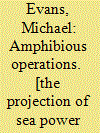

|
|
|
|
|
| Publication |
London, Brassey's, 1990.
|
| Description |
xx, 219p.
|
| Series |
Brassey's sea power; v. 4
|
| Standard Number |
0080347363
|
|
|
|
|
|
|
|
|
|
|
|
Copies: C:1/I:0,R:0,Q:0
Circulation
| Accession# | Call# | Current Location | Status | Policy | Location |
| 033270 | 355.46/EVA 033270 | Main | On Shelf | General | |
|
|
|
|
| 4 |
ID:
075715
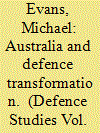

|
|
|
| 5 |
ID:
103432
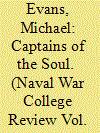

|
|
|
| 6 |
ID:
132428
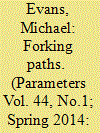

|
|
|
| 7 |
ID:
131471
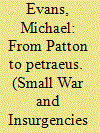

|
|
|
|
|
| Publication |
2014.
|
| Summary/Abstract |
War is the great auditor of military institutions and since the attacks of 9/11, the United States military has been under audit for well over a decade - the longest period of continuous warfare in its entire history - and one in which strategic success seems at best, ambiguous and at worst, elusive. Not surprisingly, the strategic skill and battlefield effectiveness of the American military has been a subject of great inquiry over the last five years. Thomas E. Ricks's mammoth study, The Generals: American Military Command from World War II to Today is but the largest instalment in a plethora of works examining America's military performance in the modern era by such writers as David Cloud and Greg Jaffe, Stephen R. Taaffe, Lewis Sorley, Jean Edward Smith, and Fred Kaplan.1
|
|
|
|
|
|
|
|
|
|
|
|
|
|
|
|
| 8 |
ID:
032526


|
|
|
|
|
| Publication |
London, Geerge Allen & Unwin, 1975.
|
| Description |
215p.
|
| Series |
Politial thinkers; no. 3
|
| Standard Number |
0049210211
|
|
|
|
|
|
|
|
|
|
|
|
Copies: C:1/I:0,R:0,Q:0
Circulation
| Accession# | Call# | Current Location | Status | Policy | Location |
| 014975 | 320.5315/EVA 014975 | Main | On Shelf | General | |
|
|
|
|
| 9 |
ID:
089955
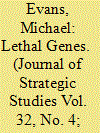

|
|
|
|
|
| Publication |
2009.
|
| Summary/Abstract |
This article examines the way in which urban areas have emerged to become one of the most common environment for armed conflict in the early twenty-first century, The essay argues that, while military professionals have sought to improve their understanding of urban military operation in an ara of global demographic movement from landscape to cityscape, strategic theory lags behind operational practice. Western strategy currently lacks an effective urban lens with policy-relevant analysis neglected within the strategic studies community. The article seeks to identify how an urban strategic focus can be developed in the new millennium. To this end, and in order to provide a context for detailed contemporary analysis, the essay examines the historical nexus between war, strategy and the city; assesses continuity and change in the characteristcs of modern urban military operations;and surveys the professional military debate on the meaning of urban operations.
|
|
|
|
|
|
|
|
|
|
|
|
|
|
|
|
| 10 |
ID:
077239
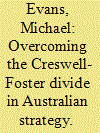

|
|
|
|
|
| Publication |
2007.
|
| Summary/Abstract |
This article examines the continuing influence of the contending twentieth century schools of Creswellian continental defence and Fosterite expeditionary defence in Australian strategy. A context for analysis is developed through an examination of the contemporary globalised security environment which is marked by bifurcation into state-centric and multi-centric threats. The demands of this new security environment have led to the evolution of twenty-first century manifestations of the Creswell-Foster divide in the form of the defender-regionalist and the reformer-globalist schools of strategy. The article analyses how differences between these two schools, especially over the value of geography, have been exacerbated by the new dynamics of globalised security. In the future, however, overcoming the contemporary Creswell-Foster divide between the defender-regionalists and the reformer-globalists in Australian strategy is unlikely to occur in the exclusive arena of defence policy. Rather, what is required is the creation of an overarching national security strategy beginning with the establishment of an Australian Commission on Twenty-First Century National Security. Such a Commission could be modelled on the US Hart-Rudman Commission of 1999-2001 and be suitably adapted to Australian conditions. An Australian commission should be charged with producing a long-term report on holistic and 'best practice' security policy options for upholding and protecting Australia's vital national interests in the first quarter of the twenty-first century.
|
|
|
|
|
|
|
|
|
|
|
|
|
|
|
|
| 11 |
ID:
101209
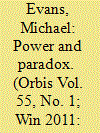

|
|
|
|
|
| Publication |
2011.
|
| Summary/Abstract |
The pattern of Asian geopolitics can be examined by employing three analytical perspectives. The first employs East Asia and the vigorous debate over the meaning of the rise of China as an intellectual prism to observe the currents of geopolitical continuity and change that are currently abroad in the Asian region. The second explores the extent to which the interacting forces of geopolitics and military modernization foster the rise of new force projection capabilities that may affect the strategic environment in Asia-particularly in East Asia. Here, the focus is mainly on the arsenals of the three indigenous Asian giants, China, Japan and India, all of whom have developed, or are in the process of developing, significant air and maritime assets whose operations have the potential to intersect in East and South East Asia. Russia is not as much a presence because it no longer possesses its powerful Soviet-era Pacific Fleet and has, in essential respects, retreated to its traditional role as a Eurasian land power.1 The third examines the future of Sino-American relations in Asia in the context of the debate over China's ascent and U. S. decline-a discussion that has intensified since the implosion of the U.S. financial system in 2008 and the onset of the worst global recession since the 1930s.
|
|
|
|
|
|
|
|
|
|
|
|
|
|
|
|
| 12 |
ID:
087919
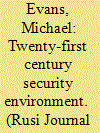

|
|
|
|
|
| Publication |
2009.
|
| Summary/Abstract |
The twenty-first century battlefield is increasingly characterised by asymmetric warfare, irregular techniques and multi-centric nodes of power. This requires a balanced joint force that is able to adapt to new operational requirements as well as meet conventional strategic needs. But is the military establishment ready for the challenges of globalised (in)security?
|
|
|
|
|
|
|
|
|
|
|
|
|
|
|
|
| 13 |
ID:
165360
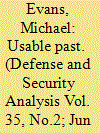

|
|
|
|
|
| Summary/Abstract |
The most effective way for the Western profession of arms to use history is to disavow the purism and narrow specialisation of today’s academia in favour of developing a contemporary approach to the subject. The latter aims to foster a range of applied diagnostic skills that transcend the temporal dimensions of past, present, and future. A contemporary approach to history for military professionals emphasises the use of inter-disciplinary war studies to enhance policy relevance. In any defense and security organisation, history must be usable in the sense of providing cognitive and interpretative skills for probing relationships between possibility and actuality, between experience and expectation, and between singularity and repetition. Using history to examine such dialectical interconnections is particularly valuable when military establishments confront their essential task of analyzing emerging trends in the future of war.
|
|
|
|
|
|
|
|
|
|
|
|
|
|
|
|
| 14 |
ID:
080088
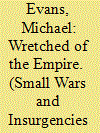

|
|
|
|
|
| Publication |
2007.
|
| Summary/Abstract |
This article examines the vital importance of political ideology in formulating effective counterinsurgency, by examining the case of Rhodesia between 1965 and 1980. During this period, the Rhodesian Front (RF) Government of Ian Smith adopted a radical right-wing 'world-struggle ideology' to justify settler resistance to African decolonisation. The RF's ideology, based on settler-status anxiety, upheld a conspiratorial interpretation of modern politics that emphasised virulent forms of Anglophobia, anti-communism, anti-internationalism and anti-liberalism. The Smith Government portrayed African nationalism not as an indigenous political phenomenon, but as an external instrument of world communism and Western appeasement. After 1972, when Rhodesia faced a protracted insurgency, many of the principles of RF ideology were applied to counterinsurgency warfare with disastrous results. Because the Rhodesian Government viewed African guerrilla warfare as unrelated to domestic politics, Rhodesian counterinsurgency lacked a realistic political dimension. The dictates of settler ideology blinded the Rhodesian Government to the vital need to win 'hearts and minds' by applying timely principles of political pacification and reform to its counterinsurgency effort. Instead a Rhodesian counterinsurgency campaign of maximum force was pursued. Such a campaign proved counter-productive accelerating strategic deterioration and leading ultimately to the political victory of the African guerrilla cause in 1980
|
|
|
|
|
|
|
|
|
|
|
|
|
|
|
|
|
|
|
|
|